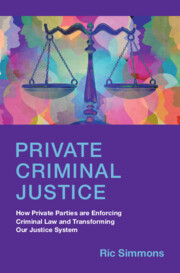 Private Criminal Justice
Private Criminal Justice Book contents
- Private Criminal Justice
- Private Criminal Justice
- Copyright page
- Contents
- Acknowledgments
- Introduction: The Rise of Private Criminal Justice
- 1 Criminal Justice without the State
- 2 A Brief History of Crime
- 3 Public Failings, Private Opportunities
- 4 Private Law Enforcement
- 5 Private Criminal Settlements as Plea Bargains
- 6 Private Criminal Settlements as Blackmail
- 7 Private Adjudications
- 8 Private Dispositions
- 9 Regulating Private Criminal Justice
- 10 The Verdict on Private Criminal Justice
- Notes
- Index
1 - Criminal Justice without the State
Published online by Cambridge University Press: 21 September 2023
- Private Criminal Justice
- Private Criminal Justice
- Copyright page
- Contents
- Acknowledgments
- Introduction: The Rise of Private Criminal Justice
- 1 Criminal Justice without the State
- 2 A Brief History of Crime
- 3 Public Failings, Private Opportunities
- 4 Private Law Enforcement
- 5 Private Criminal Settlements as Plea Bargains
- 6 Private Criminal Settlements as Blackmail
- 7 Private Adjudications
- 8 Private Dispositions
- 9 Regulating Private Criminal Justice
- 10 The Verdict on Private Criminal Justice
- Notes
- Index
Summary
This chapter discusses how a criminal justice system can operate without state input. Conventional wisdom states that the state is an essential aspect of any criminal justice system, based on three assumptions: first, only the state can delineate exactly what acts constitute a crime; second, the purpose of the criminal law is a collective, society-wide statement of condemnation against certain acts; and third, coercion and violence are often used in a criminal justice system and the state has a monopoly on the leigitmate use of force. The chapter rebuts each of these assumptions. First, the chapter notes that, through a combination of natural law and societal mores, there is a consensus on what actions should be considered criminal, even without a state legislature promulgating specific crimes. Second, private responses to criminal activity can further society's goals of deterrence and retribution, even though they also fulfill the needs of the private actors. Third, many responses to criminal activity do not require coercion or force and, even if they do, the state has authorized private uses of force in certain circumstances.
- Type
- Chapter
- Information
- Private Criminal JusticeHow Private Parties are Enforcing Criminal Law and Transforming Our Justice System, pp. 9 - 28Publisher: Cambridge University PressPrint publication year: 2023
